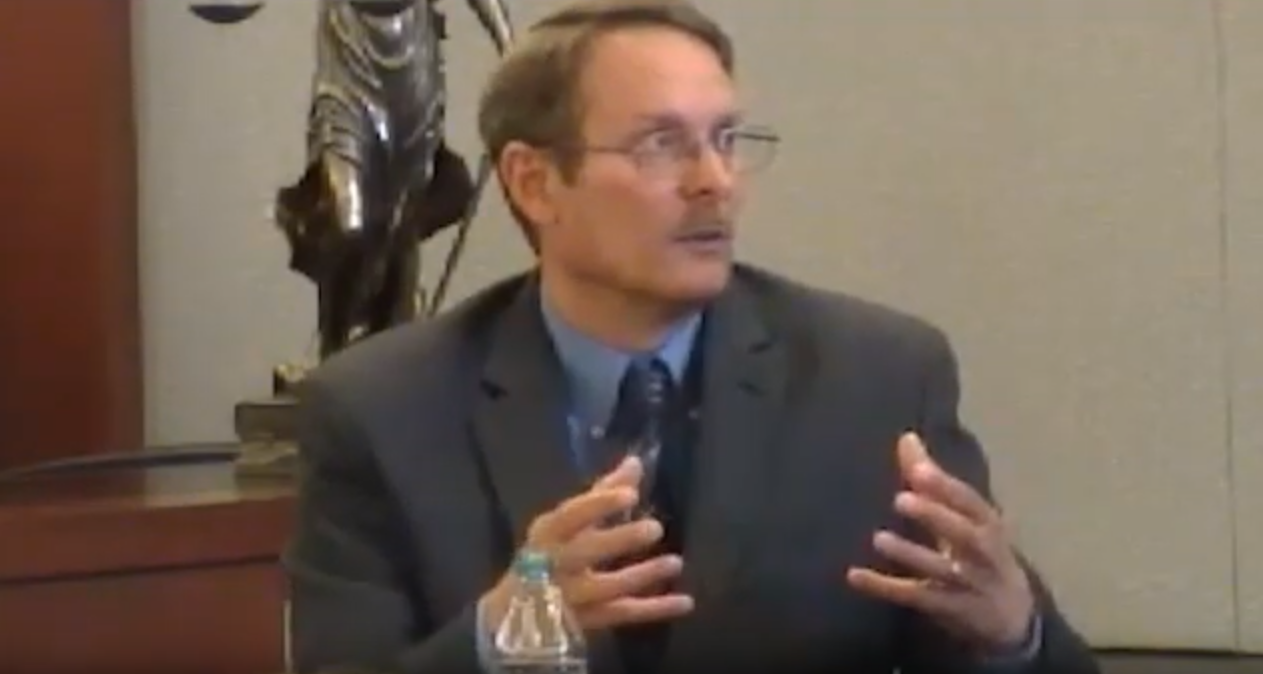

The Expert: Dr. Jeffrey Peters, a professor of molecular toxicology and carcinogenesis at Pennsylvania State University, testifies for the defense, concluding no link between Actos and bladder cancer.

In a 2014 Nevada trial, Dr. Jeffrey Peters, professor of molecular toxicology and carcinogenesis at Penn State and deputy director of the Penn State Cancer Institute, testifies for the defense against a plaintiff’s claims that the diabetes drug Actos caused her bladder cancer.
Peters addresses how his investigation into the issue concluded that there was no good evidence that Actos was involved in the development of bladder cancer. Actos is a drug used in the treatment of type 2 diabetes alone or in combination with other oral diabetes treatments. It is thought by some to bind to and be an agonist [stimulant] for an alpha receptor associated with peroxisome proliferator activated receptor [PPAR] in fat cells, which reduces circulating fat concentrations to improve insulin sensitivity, thus lowering blood glucose levels. However, this expert testifies that his experience “in the field” does not support this theory.
Activating PPAR alpha in rats and mice will cause hallmark changes in the liver. Those changes include: liver cancer, increases in liver weight, and increases in a protein marker that indicates that the receptor has been activated. The doctor testifies that in his research on this subject, Actos does not increase the size of rodent livers even at high doses, nor does Actos cause liver cancer. Finally the protein marker CYP4A, which is specifically released in large amounts when PPAR is activated, is not released by the administration of Actos even at extremely large doses. These negative results do not support Actos binding to PPAR in rodents and those receptors are the same as in humans, so this is a good experimental model for how Actos works in humans.
To explain why his findings have been inconsistent with, yet more reliable than other studies on this issue, the doctor presents a chart to the court. Other, earlier studies would rely upon a “reporter” gene assay as a screen for activity by particular drug such as Actos. A reporter gene is one that researchers attach to a DNA sequence of another gene of interest to create a clone of that sequence. That clone is then transferred into a cell. After that transfer, the cells are assayed for the presence of the reporter protein itself or the enzymatic activity of the reporter protein.
Studies using reporter assays have indicated that Actos has activity binding the alpha receptor of PPAR, but Peters points out that this analysis of Actos activity is unreliable because it does not reflect the processes that actually occur within the body just the accumulation of the reporter protein. Reporter assays thus might imply an increase in physiologic activity when in reality there is only an accumulation of “reporter” in the cell, and no change in its physiology.
The doctor’s testimony and cogent explanation to support his findings helped lead to a defense verdict.
Gary Gansar, MD, is residency-trained in general surgery. He served as Chief of Surgery and Staff at Elmwood Medical Center and on the Medical Executive Committee at Touro Infirmary and Mercy Hospital in New Orleans, LA. Dr. Gansar was Board Certified in general surgery while in active practice. He joined AMFS in 2015 as a Physician Medical Director.
The medical expert witness partner for attorneys serious about building a winning case
AMFS is your trusted source for highly-qualified medical expert witnesses. After pioneering the field nearly three decades ago, we’re continuing to redefine medical expert witness services by providing value far beyond a referral alone.
Our Physician Medical Directors know what it takes to build a strong case. Our medical expert witnesses leave no doubt. And our case managers streamline billing and logistics every step of the way, letting you focus on what you do best: constructing your winning case. Explore why AMFS clients expect more from their medical expert witnesses—and get it.
